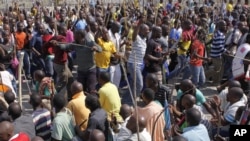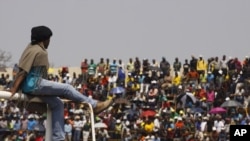JOHANNESBURG —
Negotiations to end the five-week illegal strike at an embattled South African platinum mine continued Thursday as protesters gathered outside another major mine. A union involved with the strike is calling on President Jacob Zuma to intervene in the growing crisis.
There is a joke making the rounds in South Africa: “If striking were an Olympic sport,” it begins, “South Africa would take gold, then demand silver and bronze too.”
That joke is quickly losing its humor as mineworkers across South Africa are agitating in the wake of a five-week illegal strike at the Lonmin platinum mine in Marikana township. Three major mines have been paralyzed because of labor unrest, alarming mining companies, government officials and now, union leaders, who are saying enough is enough.
A union credited with having a hand in the Markana strike, the Association of Mineworkers and Construction Union, or AMCU, says they now want President Jacob Zuma to call a top-level meeting.
AMCU Treasurer Jimmy Gama said Thrusday he wants Zuma to address wage issues, worker conditions and more at that meeting, called an “indaba” for the Zulu word for “gathering,”
“We’re looking for a holistic approach in terms of how to deal with the current [situation], because we can see this thing is now increasing, so it’s like having an emergency situation," said Gama. "It needs intervention by the highest officials of the country to call all the stakeholders together to say, ‘Hey, enough is enough, we have to do something about this, to avoid any such situation in the future.'”
The five-week strike at Lonmin's Marikana mine has had deadly consequences, leaving at least 45 people dead.
Lonmin workers launched a wildcat strike in August after union negotiations broke down. On August 16, strikers clashed with police at the mine some 100 kilometers from Johannesburg, leading police to shoot dead 34 demonstrators. The government has ordered an investigation into the matter.
Lonmin said Thursday that talks with unions were ongoing. The company reported the worst attendance figures seen so far in this month-long crisis: just over 1.13 percent of employees showed up for work.
The Marikana workers are demanding a threefold pay raise to about $1,500 a month.
Meanwhile, their absence from work has seriously impacted the platinum market and Lonmin’s productivity.
Meanwhile, their absence from work has seriously impacted the platinum market and Lonmin’s productivity.
Other mines have seen worker action as well. Mining giant Impala Platinum has said its workers are now demanding a raise - which if granted, would be their second increase in six months.
Mining giant Anglo American Platinum says it suspended operations at its Rustenberg mine this week after demonstrators gathered outside the mine. Anglo American said its employees are not on strike, but are rather being kept away from the mine by the protesters.
The strikes and protests seem to have been spurred on in part by former ANC Youth League chief Julius Malema, who earlier this week called for a national mineworkers' strike.
Malema, who was thrown out of the ANC after clashing with party leaders, has repeatedly called on workers to make South Africa’s mining sector “ungovernable” and calls his movement a “revolution.”













